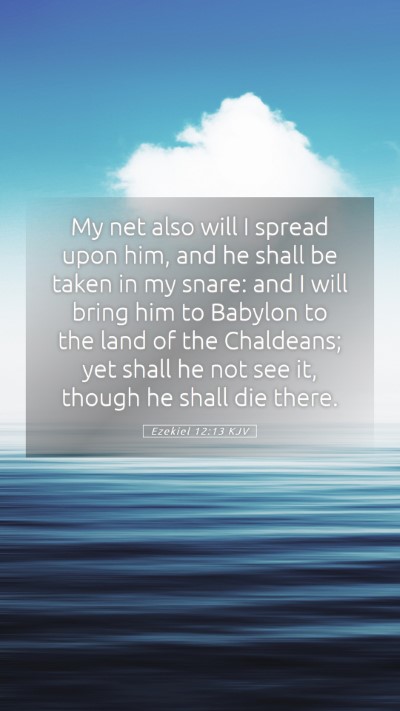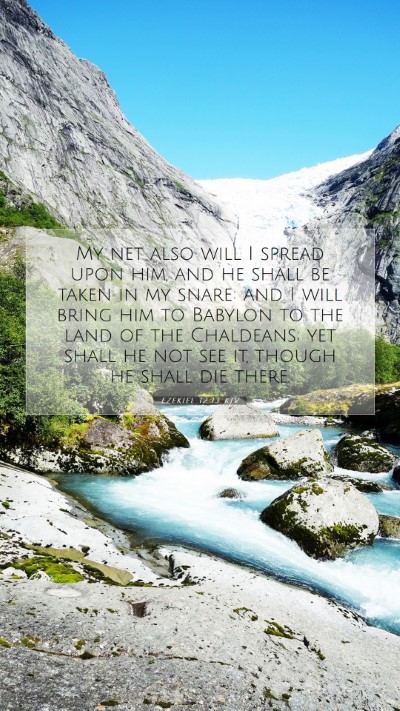Bible Verse Commentary on Ezekiel 12:13
Ezekiel 12:13: "My net also will I spread upon him, and he shall be taken in my snare: and I will bring him to Babylon, to the land of the Chaldeans; yet shall he not see it, though he shall die there."
Summary of Meaning
The verse Ezekiel 12:13 encapsulates a profound prophetic warning from God through the prophet Ezekiel. This scripture highlights the inevitable consequence of disobedience and rebellion against God’s commands. Here we explore interpretations and insights derived from reputable public domain commentaries.
Interpretations from Commentators
-
Matthew Henry:
Henry emphasizes the inevitableness of divine judgment. The "net" symbolizes God's sovereign intervention, ensnaring those who oppose His will. The imagery evokes the fate awaiting Jerusalem's king and the people who sought refuge in Egypt, ultimately leading to captivity in Babylon.
-
Albert Barnes:
Barnes notes that even though the King would be brought to Babylon, he would not see it. This represents a spiritual blindness, highlighting the idea that rebellion against God leads to judgment and loss of hope. The captivity serves as a lesson to the remnant, driving them to repentance.
-
Adam Clarke:
Clarke stresses that this captivity serves as a divine retribution. The king's death in Babylon, without ever witnessing the city you’ve been taken to, signifies a complete defeat and disillusionment, representing God's ultimate control over nations and leaders.
Understanding Scripture Through Context
This verse serves not only as a historical record but also as a spiritual warning that maintains relevance throughout ages. In the context of its time, it addressed a significant national crisis. Disobedience brought forth dire consequences, making it essential to understand historical context in biblical exegesis.
Historical Context
The context revolves around the Babylonian siege of Jerusalem and the captivity of the Israelites. Ezekiel, prophesying during this tumultuous period, delivered messages that were strikingly urgent, appealing to both the alarming situation at hand and the eternal truths of God’s justice.
Application to Daily Life
In applying the themes from this verse to our daily lives, individuals can reflect on their own obedience to God’s command. It invites believers to introspect about the direction of their lives and the choices they make. Just as rebellion led to spiritual and physical captivity, obedience fosters spiritual freedom and alignment with God’s will.
Cross References
- Jeremiah 24:8-10: This passage speaks about the fate of those who refuse to heed God's warnings.
- Isaiah 39:5-7: A parallel account to the consequences of pride and independence from God.
- Lamentations 1:1-2: Reflects the sorrow and devastation following disobedience and exile.
Conclusion
Ultimately, Ezekiel 12:13 offers profound insights into the nature of God’s judgment and mercy. For those seeking Bible verse meanings and interpretations, it serves as a crucial testament of the importance of living in accordance with God’s word. Through understanding and applying such scriptures, individuals can enhance their Bible study insights and draw closer to an authentic relationship with the divine.
Further Bible Study Resources
Individuals looking to deepen their understanding can explore various Bible study tools and courses. These resources provide guidance in studying difficult Bible passages and enhancing one’s comprehension of scripture. Utilize online Bible study lessons and courses to enrich your Biblical knowledge.


